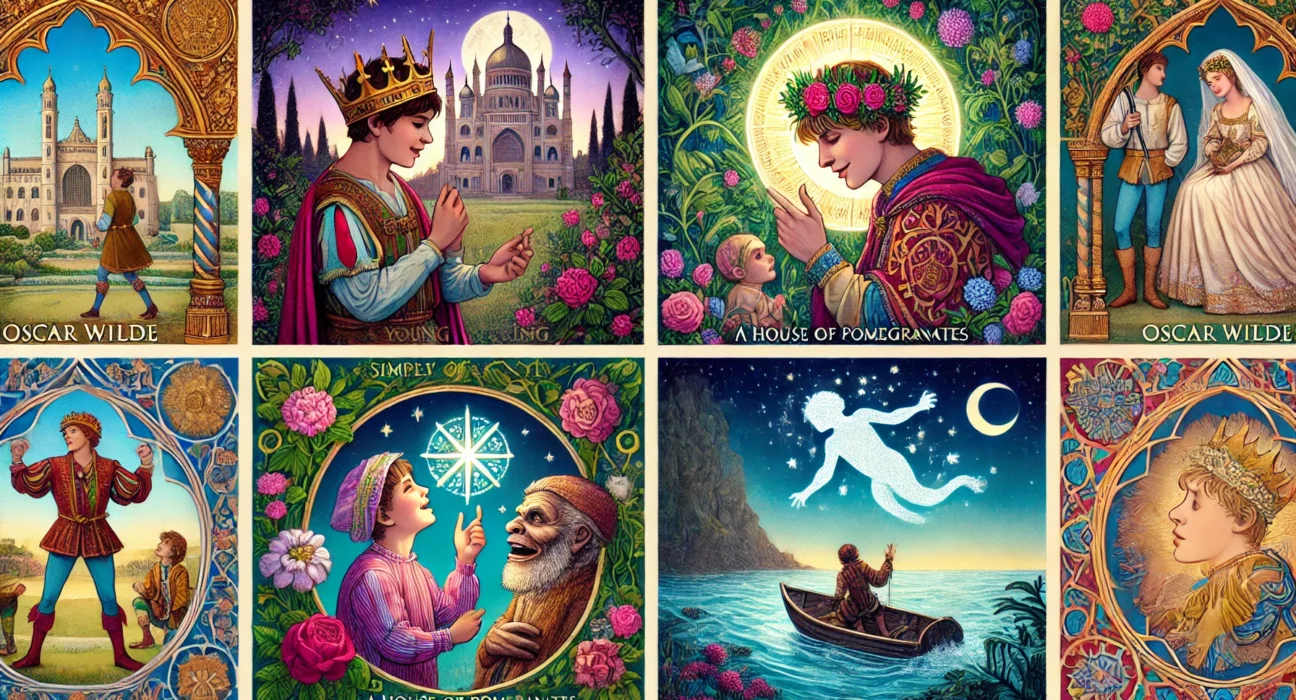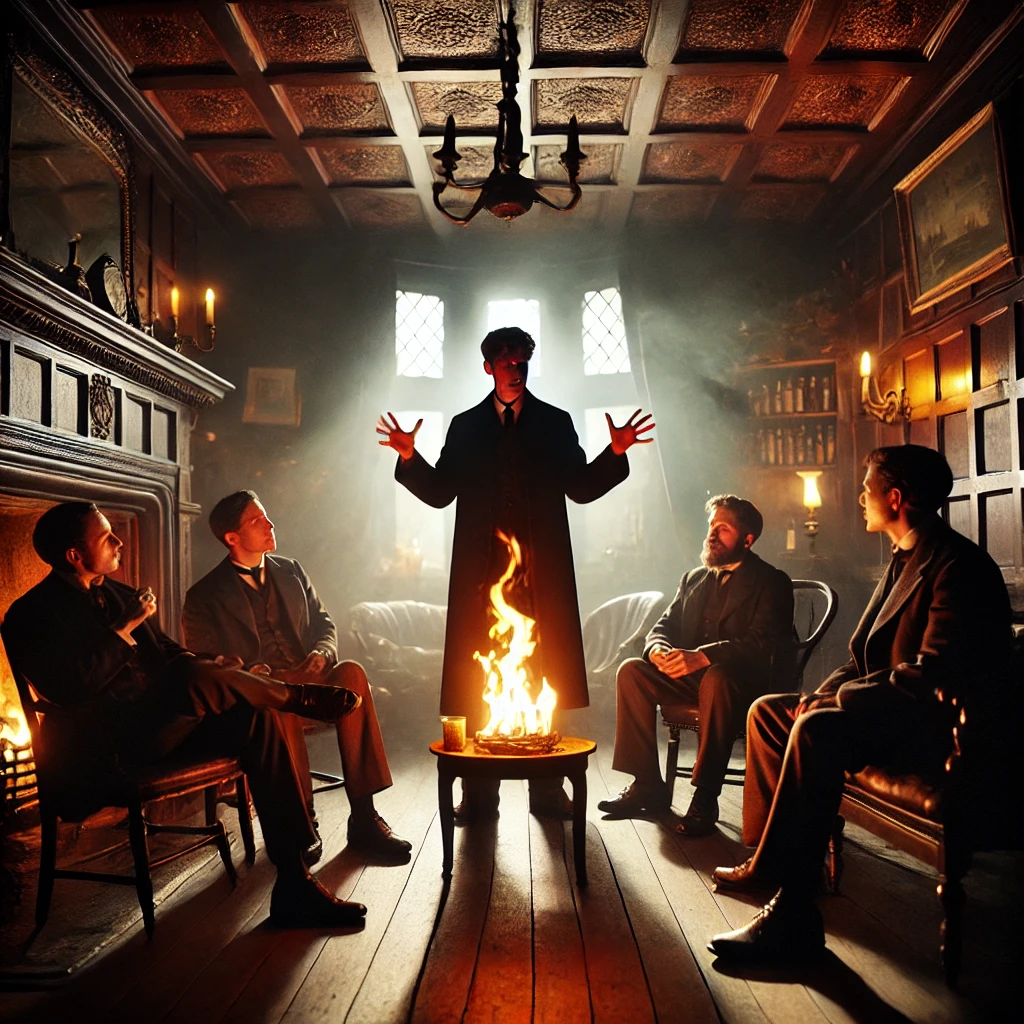“A House of Pomegranates” is a collection of four whimsical and moralistic short stories by Oscar Wilde, published in 1891. This book, written in Wilde’s signature lush and ornate prose, includes “The Young King,” “The Birthday of the Infanta,” “The Fisherman and His Soul,” and “The Star-Child.” Wilde’s tales are rich with allegory, examining themes of beauty, sacrifice, and the human condition, set in a fantastical world that merges fairy-tale elements with deep philosophical questions.
Plot Summary
The Young King
On the eve of his coronation, the young king, once a humble shepherd boy, sat alone in his opulent chamber, overwhelmed by the gravity of his impending role. Discovered by chance and revealed to be of royal blood, he was to ascend the throne, a destiny that felt surreal. As he reclined on his embroidered couch, sleep overcame him, bringing with it three haunting dreams.
In the first, he found himself in a dimly lit weaving room, where emaciated laborers toiled endlessly. Their gaunt faces and trembling hands told a tale of immense suffering as they wove the luxurious robe for his coronation. The young king watched in horror as children, pale and sickly, struggled with the heavy looms, their eyes hollow with hunger. The room was filled with a foul stench, and the air was thick with despair. He pleaded with the weaver, asking why they endured such torment. The weaver, his voice filled with bitterness, explained that they were slaves to the rich, their lives consumed by the endless demand for opulence.
In the second dream, he was aboard a ship sailing to distant lands. He watched as pearl divers, chained and desperate, plunged into the treacherous waters. One by one, they resurfaced, lifeless, their bodies sacrificed for the precious jewels that would adorn his crown. The young king’s heart ached as he witnessed the brutality inflicted upon these men, their lives deemed worthless in the pursuit of beauty. The master of the ship, indifferent to their suffering, weighed each pearl with a sinister smile, declaring them fit for the sceptre of the young king.
The third dream transported him to a desolate landscape, where slaves labored under the scorching sun, extracting rubies from the unforgiving earth. Death and Avarice loomed over them, watching with cold, merciless eyes. The young king, filled with dread, approached a slave and asked what they sought. The slave, his voice weary and broken, revealed that they mined rubies for the king’s sceptre. The young king cried out in despair, realizing that his future regalia was stained with blood and suffering.
Awakening from these visions, the young king’s heart was heavy with sorrow. The next morning, as preparations for his coronation reached a fever pitch, he made a bold decision. He refused to wear the opulent garments prepared for him. Instead, he donned his old shepherd’s clothes and crafted a crown from a simple briar rose. His courtiers and the townspeople were aghast, unable to comprehend his choice. Yet, undeterred, he walked towards the cathedral, his resolve unwavering.
As he stood before the altar, a divine light enveloped him, transforming his humble attire into a magnificent raiment. The people, witnessing this miraculous transformation, fell to their knees in awe. They recognized the young king’s true nobility, not in the trappings of wealth, but in his compassion and humility. In that moment, he was crowned, not by the hands of man, but by a higher power, his reign destined to be one of wisdom and grace.
The Birthday of the Infanta
In the sun-drenched gardens of the Spanish palace, the Infanta’s twelfth birthday was celebrated with grand festivities. The entire court buzzed with excitement, for the day was dedicated to the young princess. Among the entertainers was a grotesque dwarf, his body twisted and deformed. Oblivious to his appearance, he danced and tumbled with joy, bringing laughter and delight to the Infanta and her companions. The Infanta, with her golden hair and regal bearing, clapped her hands in glee, her laughter ringing through the air.
The dwarf, misinterpreting their amusement as affection, was filled with happiness. After his performance, he wandered through the opulent corridors of the palace, marveling at its splendor. In a grand hall, he stumbled upon a mirror. Gazing at his reflection for the first time, he was horrified by the sight of his own grotesque form. Realization dawned, and he understood that the laughter had been at his expense. Heartbroken, he collapsed and died from the shock.
When the Infanta learned of the dwarf’s death, she was unmoved. Her heart remained cold, more concerned with the loss of her amusement than the tragedy of the dwarf. Her indifference revealed a chilling truth about the aristocracy’s lack of empathy, a stark contrast to the dwarf’s innocent and trusting nature.
The Fisherman and His Soul
In a quaint coastal village, a young fisherman fell deeply in love with a mermaid. Her beauty captivated him, and he longed to join her in the depths of the sea. The mermaid told him that to be with her, he must abandon his soul. Desperate, the fisherman sought the help of a witch, who taught him the ritual to sever his soul from his body. As the ritual concluded, his soul, now free, begged to remain with him, but the fisherman, driven by his love for the mermaid, dismissed it.
Separated from his soul, the fisherman lived happily with the mermaid beneath the waves. Meanwhile, his soul wandered the world, indulging in all manners of temptations and sins. Each year, the soul returned, offering the fisherman riches, wisdom, and power, but he refused each time, his heart steadfast in his love.
Years passed, and the soul, having experienced the darkest aspects of humanity, returned with a final offer. It promised to reunite the fisherman with the mermaid if he would only listen. Reluctantly, the fisherman agreed. The soul led him to a beautiful garden, where he was reunited with the mermaid. However, this reunion was a cruel trick. The soul, corrupted by its worldly experiences, betrayed the fisherman, leading to the mermaid’s death.
Heartbroken and filled with despair, the fisherman died, his body claimed by the sea. His soul, now burdened with guilt, was condemned to wander for eternity, never to find peace or redemption.
The Star-Child
In a dense forest, a child with a star-like birthmark was found by two woodcutters. They took him in, raising him in their village. The boy grew into a strikingly beautiful youth, but his heart was vain and cruel. He lorded his beauty over others, treating those around him with disdain. One day, a beggar woman approached, claiming to be his mother. Disgusted by her appearance, he scorned her, driving her away. Immediately, his beauty vanished, replaced by hideous deformities. Cast out by the villagers, he wandered the world, seeking redemption.
To break the curse, he embarked on a long and arduous quest to find his mother. His journey was fraught with trials and suffering, each step teaching him humility and compassion. He aided the sick, shared his meager food with the hungry, and defended the weak. Through these acts of kindness, his heart softened, and he grew to understand the true nature of beauty.
At long last, he found the beggar woman, who revealed herself to be a queen. Recognizing his transformation, she forgave him, and his beauty was restored. He was crowned king, not for his outward appearance, but for the goodness that now resided within. His reign was marked by wisdom and compassion, a testament to the lessons he had learned through his trials.
Main Characters
The Young King: A sixteen-year-old boy who transitions from a shepherd to a king. His innate sense of beauty evolves into a deeper understanding of compassion and sacrifice.
The Infanta: A twelve-year-old Spanish princess, whose innocent exterior hides a heart indifferent to the suffering of others.
The Dwarf: A grotesque performer who tragically discovers his deformity and the mockery it incurs.
The Fisherman: A young man whose love for a mermaid leads him to sacrifice his soul, ultimately facing betrayal and heartbreak.
The Soul: The fisherman’s soul, representing worldly temptations and ultimately leading to his downfall.
The Star-Child: A beautiful but cruel boy who learns humility and kindness through hardship and transformation.
Theme
Beauty and Superficiality: Wilde explores the nature of beauty, contrasting physical appearance with inner virtue. The Young King and the Star-Child learn that true beauty comes from compassion and humility, not outward appearance.
Sacrifice and Redemption: Characters often face moral choices that require personal sacrifice. The Fisherman and the Star-Child undergo profound transformations, sacrificing their desires for greater, often painful, truths.
Class and Social Injustice: Wilde critiques the social hierarchies and injustices of his time. The suffering laborers in “The Young King” and the callousness of the Infanta towards the dwarf highlight the disparities between the rich and the poor.
Transformation and Identity: The stories frequently involve characters undergoing physical and moral transformations, emphasizing themes of personal growth and the search for true identity.
Writing Style and Tone
Oscar Wilde’s writing in “A House of Pomegranates” is characterized by its rich, ornate prose and vivid imagery. His style is both poetic and philosophical, blending fairy-tale elements with deeper moral and social critiques. Wilde employs a lyrical tone, often using irony and wit to underscore the moral lessons of his stories. His language is lush and evocative, creating a sense of enchantment while also conveying profound truths about human nature and society. Wilde’s narrative technique often involves framing his stories within fantastical settings, allowing him to explore complex themes through allegory and symbolism, creating a timeless and thought-provoking collection.
We hope this summary has sparked your interest and would appreciate you following Celsius 233 on social media:
There’s a treasure trove of other fascinating book summaries waiting for you. Check out our collection of stories that inspire, thrill, and provoke thought, just like this one by checking out the Book Shelf or the Library
Remember, while our summaries capture the essence, they can never replace the full experience of reading the book. If this summary intrigued you, consider diving into the complete story – buy the book and immerse yourself in the author’s original work.
If you want to request a book summary, click here.
When Saurabh is not working/watching football/reading books/traveling, you can reach him via Twitter/X, LinkedIn, or Threads
Restart reading!








